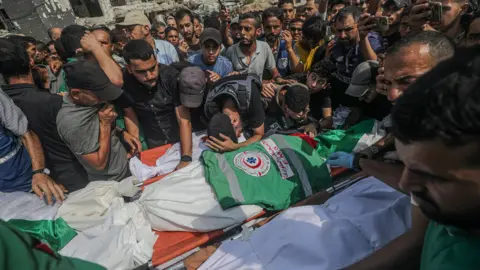The recent actions taken by the Israeli military have sparked international outrage, particularly the targeted airstrike that resulted in the deaths of six journalists in Gaza, including five members of the media outlet Al Jazeera. This incident has drawn condemnation from the United Nations’ human rights office, which labeled the strike a significant violation of international law. The airstrike took place on a Sunday, claiming the lives of prominent journalists, notably Anas al-Sharif, who served as a correspondent for Al Jazeera. Alongside Al Sharif, other victims included Mohammed Qreiqeh, a fellow correspondent, as well as camera operators Ibrahim Zaher, Mohammed Noufal, and Moamen Aliwa.
According to reports, the Israeli military justified the attack, claiming that Anas al-Sharif was linked to Hamas and acted as the head of a terrorist cell within the organization. However, this assertion has been strongly contested by al-Sharif, who denied involvement with Hamas. Evidence supporting Israel’s claims was notably scant, fueling skepticism regarding their authenticity. Reports from the BBC, in particular, clarified that al-Sharif may have had previous associations with a Hamas media team but had no current affiliations amid ongoing hostilities.
The attack on the journalists has garnered widespread condemnation from various parties, including media rights organizations and several nations, such as Qatar. In response to the incident, UK Prime Minister Sir Keir Starmer’s representative expressed that the UK government is “gravely concerned” and urged for an independent investigation into the circumstances surrounding this tragedy. The spokesperson emphasized that Israel must take necessary measures to ensure the safety of journalists, allowing them to operate without the threat of violence.
Funeral services were held the following day for the victims, drawing large crowds in Gaza City as the local community mourned their loss. Anas al-Sharif, known for his substantial online presence and following, was remembered as a pivotal figure in the region’s media landscape. The Committee to Protect Journalists (CPJ) expressed particular dismay over the targeting of journalists, exemplifying a concerning trend where reporters are increasingly labeled as militants based on unverified claims. Ending their statement, they highlighted the alarming fact that the attack on the media professionals must be viewed within the broader context of escalating violence toward journalists in conflict zones.
In the aftermath of the strike, Israeli military officials asserted that documents allegedly recovered from Gaza suggest al-Sharif’s affiliation with Hamas, detailing supposed personnel rosters and identification lists. However, critical observers, including major news outlets like the BBC, reported that they have not been provided with credible evidence of al-Sharif’s involvement or any justification for the deadly attack on the entire crew of journalists. The Foreign Press Association also voiced its outrage at the killing of the journalists and noted that previous accusations against Palestinian journalists often lacked substantive proof.
Furthermore, the ongoing military operations have yielded a devastating impact on civilians in Gaza, with reports indicating that over 61,430 individuals have perished as a result of the conflict, alongside dire humanitarian crises. The UN has reiterated the necessity for Israel to uphold its obligations to protect civilians, including journalists, and stressed the urgency for safe, unrestricted access to Gaza for media personnel. Reports from the UN’s humanitarian agency indicated a profound scarcity of aid reaching the region, with warnings of impending famine conditions exacerbating the humanitarian disaster.
The situation in Gaza has continued to deteriorate, manifesting itself in the form of increasing malnutrition-related deaths, particularly among vulnerable populations including children. As humanitarian agencies grapple with access issues to deliver necessary aid, the extent of the crisis remains alarming, showcasing the urgent need for comprehensive and coordinated international humanitarian efforts. These developments underscore the grave consequences of the ongoing conflict, challenging the international community to respond effectively to ensure the protection of journalists and the provision of critical assistance to civilians in conflict zones.











